Last week we saw how often the Virgin Mary is mentioned in the New Testament. Nobody except her Son comes close. Then… well, go back and read it for yourself. We stopped in the middle this section.
What the Bible teaches about Mary
5 Does the New Testament tell us that Mary is the Mother of Christians, the Mother of the Church? Yes. There is, of course, no distinction between the titles, since the Church is the People of God.
Let’s spend some time on this one.
First, the theology. In the New Testament, the Church is the “Body of Christ”, the place of his bodily Presence in the world – as is the Holy Eucharist, but that’s another story. As Paul 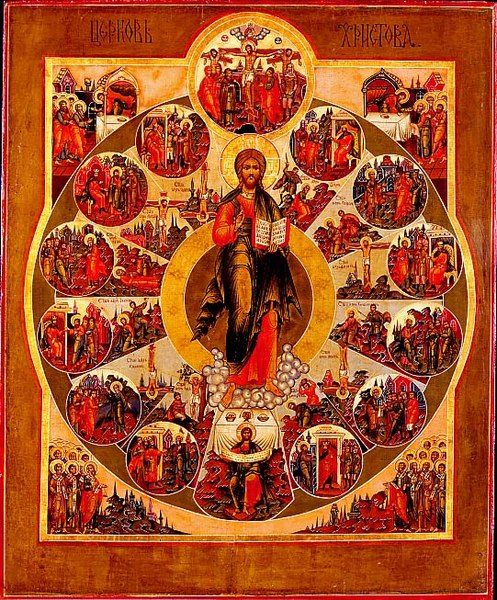 put it, Christ is the Head, we are the members of his Body. 1 Corinthians 12:27 – united with him just as hands and arms are part of the human body. Now, Christ is God. He has never been limited to the Divine Human Being who dwelt on earth – neither before his Incarnation nor after his Ascension. In his Person he now incorporates all who are joined to him into a “multi-personal bodily Person”. (Is that a safe way of expressing the Mystery?) Anyway, the point is that, since Mary gave birth to Christ bodily and is his Mother, it follows that she is necessarily also Mother of his Body the Church. She is our Mother, too.
put it, Christ is the Head, we are the members of his Body. 1 Corinthians 12:27 – united with him just as hands and arms are part of the human body. Now, Christ is God. He has never been limited to the Divine Human Being who dwelt on earth – neither before his Incarnation nor after his Ascension. In his Person he now incorporates all who are joined to him into a “multi-personal bodily Person”. (Is that a safe way of expressing the Mystery?) Anyway, the point is that, since Mary gave birth to Christ bodily and is his Mother, it follows that she is necessarily also Mother of his Body the Church. She is our Mother, too.
Let’s come at it in another more “human” way, and look at a sometimes misunderstood passage.
“While Jesus was still talking to the crowd, his mother and brothers stood outside, wanting to speak to him. Someone told him, ‘Your mother and brothers are standing outside, wanting to speak to you.’ He replied, ‘Who is my mother, and who are my brothers?’ Pointing to his disciples, he said, ‘Here are my mother and my brothers. For whoever does the will of my Father in heaven is my brother and 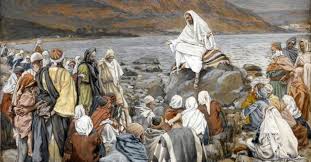 sister and mother.’” Matthew 12:46-50
sister and mother.’” Matthew 12:46-50
At first reading this seems to be a sort of “putdown” of his Mother. But that couldn’t have been the case. We know how he loved and respected her. For example, at the Wedding at Cana of Galilee he even allowed her to influence him – and indeed he learned from her how to “make the most” of his first great Sign. (We’ll say more about that in a minute.) You know how from the Cross, he provided her a new “son” John, to care for her after his death. And especially in this instance when she came worrying, as all loving mothers would, to make sure her Son was looking after himself, how could he help but love her? So he could not have been rejecting her. There must be another “angle” on this.
There is. Here Jesus was honoring his Mother, for he knew she had completely obeyed and kept the will of God. She had said to the Archangel, “Let it be to me according to your word”. Now Christ was expanding his family (and hers) from a natural family into a “super-natural” Family. People would become members of his Family, not by the water of the womb and physical birth, but by the water of Baptism and a new spiritual birth into a life of doing the will of his Father – just as she already had.
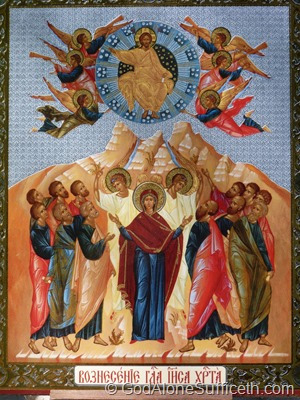 An Italian movie from the 1960s showed the Virgin Mary realistically, now in her 40s. When she first heard these words of Jesus, a look of shock came over her – but then she looked out over the crowd, and very slowly a big smile came over her face. You could see what she was thinking: “Now they’re all my family!”
An Italian movie from the 1960s showed the Virgin Mary realistically, now in her 40s. When she first heard these words of Jesus, a look of shock came over her – but then she looked out over the crowd, and very slowly a big smile came over her face. You could see what she was thinking: “Now they’re all my family!”
What would any family be without a loving mother? And Mary is the best of them. Why else would God have chosen her to be his own dear Mother? Generation after generation of Christians have turned to her for what mothers provide so well: a godly pattern to follow, help, consolation, comfort, guidance, motherly love – someone to care about us as she did for her Son. Mary, the Mother of Christ our God and Mother of all Christians, all who follow her example: “Let it be to me according to your word.”
Does this in any way detract from our love of God? our love for Jesus? Of course not. People, get rational! Think! Does your love for your own natural mother separate you from God? Then why ever should our love for our Mother Mary do that?
6 Does the Bible teach that Mary is our Advocate with her Son? Yes. At the Wedding in Cana of Galilee she “advocated” with her Son on behalf of a family friend. If she did it then, why would she have stopped now? Certainly she doesn’t talk him into something he does not will to do, contrary to the will of his Father. But 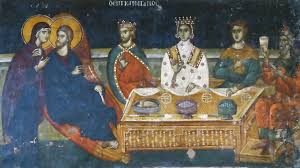 at Cana she helped him to see what his will really was. He was hesitating. I’d guess he wanted to do something more significant for his first Sign, rather than “waste” it making wine for a wedding reception. It was our son David’s godmother who helped me understand this, just as Mary helped Jesus to understand. This was an act of pure unselfish humble kindness, done quietly without calling attention to himself, just to save a family friend from embarrassment. That was no “waste”. It was the love of God in action.
at Cana she helped him to see what his will really was. He was hesitating. I’d guess he wanted to do something more significant for his first Sign, rather than “waste” it making wine for a wedding reception. It was our son David’s godmother who helped me understand this, just as Mary helped Jesus to understand. This was an act of pure unselfish humble kindness, done quietly without calling attention to himself, just to save a family friend from embarrassment. That was no “waste”. It was the love of God in action.
So why should their relationship have changed now? I’m thinking things in heaven are not so far different from those on earth – including the relationship of Mary and Jesus. I think we tend to “overspiritualize” (de-humanize?) heaven. We don’t know the “ins and outs” of that blessed Country. But we do know that Jesus Christ rose bodily and ascended bodily. He is still a human being, a Man – the Fourth Ecumenical Council made that clear. And his Mother is still his Mother. I suspect she still whispers into his ear from time to time.
7 Do the Scriptures teach that Mary has been glorified in heaven? Yes.
Yesterday, August 15, is the day when both Orthodox and Roman Catholics celebrate the major feast of Mary’s death and and 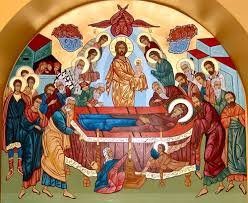 entrance into heaven. We each take a slightly different approach concerning precisely what happened then. English-speaking Orthodox usually title the day “The Dormition”, which is Latin for “Falling Asleep”. (The Greek word is “Kimissis”.) Our Orthodox icon shows Christ receiving her pure soul into heaven.
entrance into heaven. We each take a slightly different approach concerning precisely what happened then. English-speaking Orthodox usually title the day “The Dormition”, which is Latin for “Falling Asleep”. (The Greek word is “Kimissis”.) Our Orthodox icon shows Christ receiving her pure soul into heaven.
Roman Catholics call the day “The Assumption”. They have a dogma (promulgated not until 1950, but believed much earlier) that she was taken bodily (assumed) into heaven, like her Son. Probably most Orthodox believe this as well (I do, on the evidence), but we have no formal teaching about it. Many Orthodox sources take her bodily Assumption for granted. However, after thirty years of searching I have found not one Orthodox hymn or text that clearly refers to it. Both Roman Catholics and Orthodox agree that the Mother of God has now been glorified in heaven.
O Theotokos, in giving birth you have been preserved in virginity and in your falling asleep, you have not forsaken the world. For while living you were translated, being the Mother of Life. Wherefore by your pleading, deliver our souls from death.
Why do we believe this? Because John in his Revelation/Apocalypse wrote about it: “Now a great sign appeared in heaven, a Woman clothed with the sun, with the moon under her feet and on her head a garland of twelve stars… She bore a male Child who was to rule all nations with a rod of iron”. Revelation 12
Some say the Woman in the vision is Judaism which gave birth to the Messiah, so to speak, with the twelve stars representing the twelve tribes. * Some say she is the Church which now brings Christ into the world. I think that is true, for she is adorned by the Twelve and she is Mother of the Church.
* Correction made after the original text was written, thanks to Comments sent in by readers. See below.
But how could John not first of all have meant Mary, the Woman who literally gave birth to the One who was to rule the world? Mary, his adopted Mother, and he her adopted son – whom he looked after for the rest of her life. She must have been on his mind almost continually.
At the beginning of his Revelation, John had seen Jesus Christ radiant in his own heavenly light. Revelation 1:9-18 Now he sees Mary clothed with the light of her Son, Mary now “deified”. Mary with the moon, this lower world, at her feet – Mother of the world. Mary adorned by twelve stars, the Apostles – Mother of the Church. This humble girl from a little village of Galilee!
The Virgin Mary has been glorified in heaven. This surely is the meaning of this passage – and it’s startling how many non-Orthodox, non-Roman Catholic commentaries studiously avoid it!
8 Has the Orthodox Church here turned Mary into a “mother goddess”, as some contend? No. But God has!
We Orthodox sing that she is “More honorable the the cherubim and beyond compare more glorious than the seraphim”. Is that Scriptural? Yes.
And she will not be alone in this. This is what we all can be. This is our future. Paul, writing to the Corinthians, passes off the following comment without explanation, as if everybody knew this: “Do you not know that we will judge angels?” 1 Corinthians 6:3 The rest of the New Testament does not elaborate on the theme, but the Church has. Saint Athanasios the Great wrote “God became Man the man might become god”. And not only the Orthodox: In his book The Weight of Glory, Anglican C.S. Lewis (here he comes again) wrote: “It is a serious thing to live in a society of possible gods and goddesses, to remember that the dullest most uninteresting person you can talk to may one day be a creature which, if you saw it now, you would be strongly tempted to worship.” (Lewis also pointed out that the horrible opposite is possible, but let’s not talk about that now.) The Church describes this as our “theosis”, deification. What Christ is by nature, we can become by grace. Our Mother Mary is just the first of us mortals to get there. And, to review, why do we believe she arrived first? See Point 7 above.
This is Arabic Byzantine Orthodox chant – except for the airplane at the beginning!
Now, for any Protestants still in process:
In this article I have tried to stick pretty closely to passages from the New Testament. We Orthodox believe the Holy Scriptures have been the door which has helped open the way to our love of Mary, the signpost which has pointed us to her, and also the rule which has kept our devotion to the Virgin Mary in order.
But the Bible naturally says nothing about the Theotokos in centuries whiich followed: Her miraculous protection and love shown to people![]() , her numerous weeping icons. (See Post 79), her occasional appearances. And a lot more.
, her numerous weeping icons. (See Post 79), her occasional appearances. And a lot more.
All these came with time.
For example, the time when a rather “fussy” bishop was visiting our Saint Nicholas Church. Deacon John and I were both extremely nervous, but as we stood before the icon of the Theotokos on our icon screen saying our preparatory prayers, we each independently felt a coolness, a calm, a peace pour forth almost palpably from her, and after that we were at ease. After Liturgy we were amazed to find that we had both had the same experience.
Let me stress this: Of course, we honor and obey God first, Father, Son and Holy Spirit. He is the source of all things. None of the saints, beginning with Mary, would think of doing anything contrary to the will of God. That’s why they are saints. Their work on earth is this only: to lead us to their Lord and God and Savior Jesus Christ, and ours.
But let’s have none of this “me and Jesus” religion, or even “me and God”. If you become a Child of God, you get the whole Family, in heaven and on earth. Beginning with Mother.
So if any of you have read the Bible and have missed Blessed Mary, please read again. It is sad beyond words that so many Christians today are “without” their Mother Mary and her love. But actually they’re not. Like all good mothers, she never stops loving her children – even those who have forgotten her.
Mary our Mother, Mary full of grace.
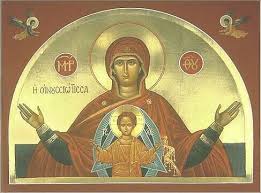
+ + + + + + +
Next Two Weeks: From the sublime to the utterly awful – Guns in Church? Don’t say I didn’t warn you.
After that things will improve again.

Father, aren’t there 12 tribes of Israel, rather than 7?
Ostensibly, what is the difference between the various persons in the Bible who ask Jesus to perform miracles as opposed to Mary the mother of God? From the Bible alone, It seems he is “persuaded” by many without any particular priority for his Mother (ie the friends of the paralytic, the centurion, the ruler Jairus, etc).
And, I was listening to Dr Constininou on Ancient Faith who said that Mary has not in fact been resurrected (because only Jesus has) and that while Tradition holds that her body has been taken up, that we should not speculate as to exactly what form this has taken. I would add that Mary is not the only person whose body has been taken up. Elijah was taken up in a whirlwind, as well as the body of Moses. So, isn’t it inaccurate to say that Mary is “the first of us mortals for us to get there”?
It seems like there is this constant temptation to elevate Mary beyond what Holy Tradition and the Scriptures have provided. Saint John Maximovich seems to warn against this in his treatise on the Mother if God, and says it actually detracts from her real glory. I also spoke to one Orthodox father who said that while Mary was under original sin, she was sinless. Yet Saint Maximovich said it would negate her need for Salvation if she was sinless. Which is it? It seems like Orthodox do not all agree.
Here are my opinions (no more than that): 1) Do the others in the Gospel beg Jesus to help? while Mary persuades him? or even guides him? 2) Moses and Eliljah (and maybe Enoch) were taken into heaven. But there are various levels of heaven. Remember that Paul in his vision was lifted up to the third heaven. Mary is the one who has been lifted all the way to the top. 3) What Mary was has not been revealed to us. All we know is that she has now achieved sinlessness. What do you think?
Well, begging vs. persuasion seems like a fine point when the distinction is being used to infer a special status, and I think you could say that Mary was begging Jesus to help out at the wedding at. Cans. What words specifically make this persuasion instead? Regardless, I would say the Canaanite woman was both begging and persuading Jesus in Mark 7.24-29 when she prevails upon Jesus to heal her son of demonic possession by comparing herself to a dog that eats scraps from the master’s table. Jesus actually says it is her reply that convinces him to heal her son, so I would call that persuasion. Does that give the Canaanite a special status in a higher rung of heaven, assuming that she is now in a glorified state?
Do I believe that Mary has achieved sinlessness? Well, David says in Pslams 51 that surely he was sinful from birth, sinful from the time his mother conceived him. Paul said in Romans 3:23 that all have sinned and fall short of the glory of God. The beloved disciple says in 1 John 1:28 that if we claim to be without sin, then the truth of God is not in us. So it seems to contradict scripture to say that Mary was sinless, and even Saint John Chrystostom said she was imperfect (Co. Io. 20-21).
On the other hand Jesus was without sin (Hebrews 4:15). Because the wages of sin are death, It was precisely the fact that he was sinless that enabled Jesus to die in our place. So to say that Mary is also sinless seems to contradict the several places in scripture that say that all have sinned, and to undermine the unique quality of Jesus as our spotless lamb, who overcame death by his death. Of course, Catholics developed the idea that Mary was born without sin, and that she did not die., and that she is a co redeemer with Christ. It is a natural evolution from these distortions of scripture and actually contradicts scripture and holy tradition.
If you really think about it, it would be impossible for Mary to be born without sin. As Saint John Maximovich says, she would have had to have been conceived by saints Joachim and Anna without sin for that to have occurred. For that to have occurred, Anna and Joachim would in turn have had to have been conceived without sin, and so on, all the way up to Adam. But that would negate the entire story of salvation. We are all dead through Adam, but in Christ all are made alive.
Is Mary at the top tier of heaven? Perhaps so but remember when Paul went to heaven, he was commanded not to utter its mysteries (2 Cor. 12:4). So why speculate when we can’t really know for sure?
My understanding of the sinlessness of Mary is that she lived a holy life by God’s grace, but she was still subject to the consequence of the Fall. If you look at it in a juridical sense, you have to work toward Mary being sinless by nature and you get into the Immaculate Conception and such. If you look at it in the therapeutic sense, one can still need the cure, but be able to live in holiness by grace.
1) Begging vs. persuading: Well, actually she isn’t exactly begging at Cana. She pushed him into it! I don’t know if I’ve use the right words for this, but I think the difference lies in her relationship to him: mother vs. supplicant.
2) Mary: Was she imperfect early in her life? I would guess not. Was she perfected by the time of Jesus’ birth? I would guess so. But I don’t see the purpose of speculating much about things we can’t know. Perfected now? That seems to be the clear implication of John’s vision of her in heavenly glory. The belief of a small minority of RCs that Mary did not die is also just speculation, definitely not in accord with early traditions about her “falling asleep” and burial. Co-redeemer? Certainly not if it means raising her to the level of Christ! But in another sense we all as members of the Body of Christ participate in his redeeming work. We all mediate Christ’s love to each other.
3) Mary at the “top tier”? Again, that seems to me to be not speculation but the implication of John’s vision of her.
The icon at the end…what is that long, Greek word? Quite a mouthful. There’s a bit of a boo-boo in the analysis of Revelation 12. You have seven tribes of Israel, but there are twelve.
Yes! Twelve! So the Woman is also Judaism. I knew that long ago. At my age I can attribute my mental glitches to senility instead of stupidity. Thanks to both of you. I’ve revised what I wrote in the Post.
I can’t make out the word on the icon. I think it ends “tissa”. Can anyone help?
Hello Fr. Bill,
I never comment on these things… but I love your blog and like a good challenge.
It looks like the icon says Η Οινουσιώτισσα. According to google translate Οινουσια means wine. The Oxford Greek pocket dictionary also says οινος means wine.
Wikipedia notes that Ισσα makes a noun feminine.
I’m not a linguist…I’m imagining this translates to something like
“Lady of the Wine” or “Theotokos the Vintnerness.”
Thank you, Presvytera. Could this have something to do with the wedding at Cana? Just guessing. I’ve never heard of such an icon.
This icon is above the altar in our chapel. The triangular motif around Jesus always makes me think of the Star Trek logo, so this icon gave me a retro-futuristic impression from the beginning. Orthodoxy–the religion of the future.
That would be my guess as well.
Mary asked Christ for more wine, which signifies LIFE and Grace, at the WEDDING FEAST. And he complied, despite his hesitation. Aren’t the implications obvious enough? No one else asked that of him or even close. The vision is based on the gospel written in the stars, which the pagans corrupted into what we now call astrology. I believe Mary, especially in her time as literally god bearer, embodies the true Israel. Some also use this vision to date Christ’s birth at the Civil new year, when Israel’s kings were coronated.
We aren’t gnostics. Supposedly. To be raised ‘from out of the dead’ is to be resurrected. And Mary is alive. As St. Athanasius put it: “the work of Christ, which results in resurrection from henceforward…” and also…”men do not die as they did formerly….” Matthew 27 and Revelation tell us of those first fruits who were resurrected with Christ and appeared first on Mt. Zion followed by the general harvest, and of the first resurrection, “blessed and holy is he who has part in the first resurrection,” immediately after the destruction of that “great harlot,” “the great city wherein our Lord was crucified.” The Matins liturgy is clear enough, Jesus raised the dead from Hades. The Creed also states Jesus’ coming and judging in the imperfect, that is, as an ongoing reality now. The entire new testament places such emphasis on the end of that generation, as Christ put it “…that all things written may be fulfilled” because “the old tabernacle no longer standing, the way to the true holy of holies is manifest.” Hebrews 9
If Christ is omniscient, wouldn’t He had known that this would be His first miracle? And why would He ever think it to be a “waste” to do something seemingly small (in the eyes of world)? Does the Son of God really need help understanding? I ask these questions not to undermine or downgrade Mary whatsoever- rather, I ask to understand the divinity of Christ here on earth. If Christ was (is) fully God and fully human, I struggle to understand this explanation and some of the comments within this article (point 6).
Thank you for your time,
Brandon
I think for the same reason we all are commanded to pray – because God, though he has total understanding of all things, still allows us to participate in his “decision-making” (is that the right word?), in his writing of history. Just as he allows the poor widow to “badger” the unjust judge into action. (Luke 18:1-8) What an off-the-wall parable for Jesus to apply to God! (Sorry, Lord…) Exactly how this works God only knows.